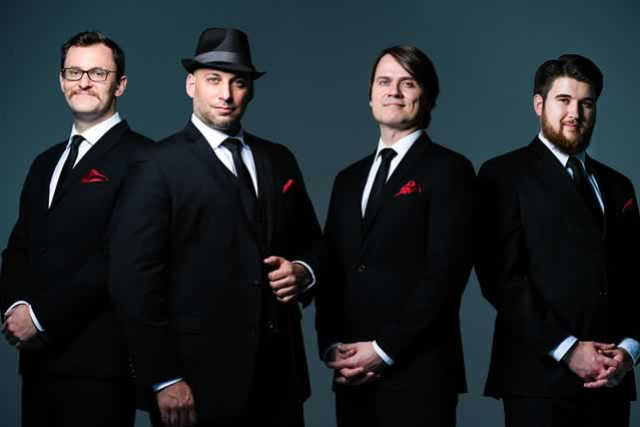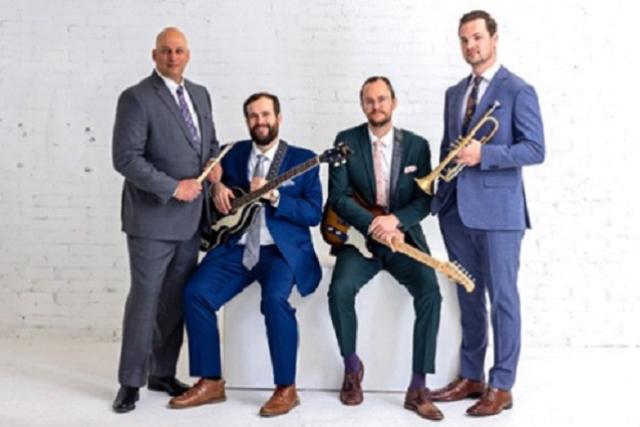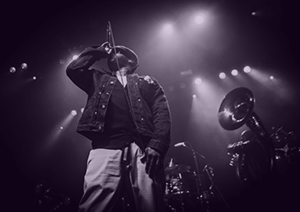
The Four Freshmen
In 1948, four young men created a sound that forever changed the way vocal jazz harmony was heard and performed. Known as The Four Freshmen, the group started with two brothers, Don and Ross Barbour, their cousin Bob Flanigan, and friend Hal Kratzsch. With a soaring, true tenor in Bob Flanigan, the group created a sound that has endured for over 6 decades. Hal Kratzsch sang the bass part and played trumpet. He sang the bass part with a big sound, laying the foundation for the Barbour brothers to add their beautiful inner part stylings. Ross sang the 3rd part and played drums. Don sang the 2nd part and played guitar. Thus, the original Four Freshmen was born and began touring, playing bowling alleys and small clubs across the country.
Today, the group lives on with Bob Ferreira, joining the Freshmen in 1992, who sings the bass vocal part and plays drums. Jonathan Gaines, joining the Freshmen in 2017, sings the 3rd part and plays trumpet. Stein Malvey joined the Freshmen in 2013, he sings the 2nd part, and plays guitar. Tommy Boynton who joined the Freshmen in 2015 and sings the lead vocals and plays bass.

In 1948, four young men created a sound that forever changed the way vocal jazz harmony was heard and performed. Known as The Four Freshmen, the group started with two brothers, Don and Ross Barbour, their cousin Bob Flanigan, and friend Hal Kratzsch. With a soaring, true tenor in Bob Flanigan, the group created a sound that has endured for over 6 decades. Hal Kratzsch sang the bass part and played trumpet. He sang the bass part with a big sound, laying the foundation for the Barbour brothers to add their beautiful inner part stylings. Ross sang the 3rd part and played drums. Don sang the 2nd part and played guitar. Thus, the original Four Freshmen was born and began touring, playing bowling alleys and small clubs across the country.
Early on in their career, the Freshmen met Stan Kenton. He had heard the rumors of a vocal group that sounded like his band. The Freshmen were all fans of Kenton and in many ways, modeled their sound after the Kenton trombone section. Once Kenton heard them, he was hooked. He loved the group and believed in them so much that he approached Capitol and essentially got the Freshmen signed in 1950. This led to a fruitful partnership between Capitol Records and the Freshmen for over 10 years. During the Capitol years, the Freshmen had some of their biggest hits, including their first hit with Capitol called "It's A Blue World."
Bob Flanigan, of Greencastle, and his cousins, Ross and Don Barbour, of Columbus, began performing at a young age during family reunions. They also shared a deep appreciation of harmonizing barbershop quartets.
After stints in the military, the Barbour brothers reunited in 1947 at the Jordan Conservatory of Music at Butler (now Butler University’s Jordan College of Fine Arts).
There, they teamed with Hal Kratzsch of Warsaw.
The Barbour brothers, Kratzsch and fellow music student Marvin Pruitt formed a barbershop quartet known as "Hal's Harmonizers." Pruitt was not one for the stage, so he was replaced by Flanigan. With Flanigan on lead vocals and a jazz repertoire added, the reenergized band renamed "The Toppers" started to jell. They tested out their new sound at malt shops around the Butler campus and at local lounges.
The group was heavily influenced by the big band sound of Glenn Miller's The Modernaires, the velvety sounds of Mel Torme's Mel Tones and Stan Kenton's vocal group The Pastels.
They were four voices singing a five-part harmony subtly inflected with jazz. But they weren't just singers. The group could hold their own with any instrumental combo in the business, accompanying themselves on drums, bass, guitar and horns.
Before their first show in Fort Wayne in 1948, their agent renamed them "The Four Freshmen."
It was Kenton that heard the group in Dayton, Ohio, and got the group their first recording contract with Capitol Records — and off the Midwest lounge tour.
The Four Freshmen toured with Kenton and his orchestra and recorded two albums with them: one at Purdue and one at Butler.
They scored their first hit in 1952 with "It's a Blue World," followed by "Mood Indigo,""Day by Day" and "How Can I Tell Her." The group credited their success to their appeal to a college-age audience.
The quartet had a cameo appearance singing "How D'Ya Like Your Eggs in the Morning?" in the 1951 movie musical "Rich, Young and Pretty" starring Jane Powell and Wendell Corey.
The Four Freshmen became influencers in their own right. Their four-part harmonies guided the musical stylings of The Letterman, The Manhattan Transfer and other vocal groups.
The Beach Boys covered the 1956 Four Freshmen hit "Graduation Day" in 1964. Brian Wilson described the influence the Four Freshmen had on the Beach Boy sounds in his biography, "Inside the Music of Brian Wilson: The Songs, Sounds and Influences of the Beach Boys' Founding Genius."
"I couldn't get enough," Wilson said. "I bought every album and single I could find. I played them till the grooves wore out. Transfixed. Fascinated. I absorbed every note of every song, figuring out how the lush, intricate harmonies were woven together, discovering on my own how to do it myself."
The Four Freshmen were nominated for six Grammy Awards, but never won.
Ross Barbour retired in 1977 to go into the real estate business in California, ending 29 years in music. He died in 2011.
Don Barbour left the group in 1960 and died in an automobile accident 13 months later.
Flanigan sang with the group until 1992, but continued as the group's manager until his death in 2011.
Kratzsch left the group in 1953 and died in 1970.
Since their founding in the late 1940s, there have been more than 25 different members of the Four Freshmen, but the same vocal harmony style that started on the campus of Butler University still continues today.
